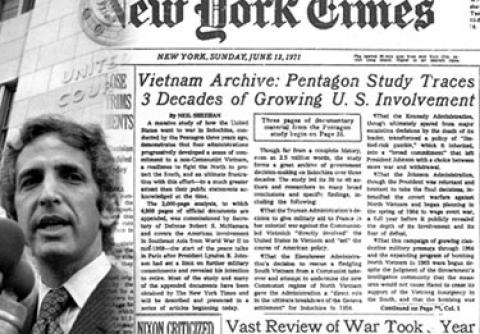What were the Pentagon Papers?
 In 1967, Secretary of Defense Robert McNamara ordered a study of U.S involvement in the Vietnam War dating back to the Truman presidency. This study, officially named the "Report of the Office of the Secretary of Defense Vietnam Task Force", was conducted by a team of analysts from the Department of Defense. The basis of their study came from classified information taken from the State Department, Central Intelligence Agency, and the Department of Defense. The report was completed in 1969, eventually consisting of 7,000 pages of description and corresponding evidence. As it became more publicly accessible, the report would become known as the "Pentagon Papers".
In 1967, Secretary of Defense Robert McNamara ordered a study of U.S involvement in the Vietnam War dating back to the Truman presidency. This study, officially named the "Report of the Office of the Secretary of Defense Vietnam Task Force", was conducted by a team of analysts from the Department of Defense. The basis of their study came from classified information taken from the State Department, Central Intelligence Agency, and the Department of Defense. The report was completed in 1969, eventually consisting of 7,000 pages of description and corresponding evidence. As it became more publicly accessible, the report would become known as the "Pentagon Papers".Publication
One of the analysts who worked on the study was Daniel Ellsberg, a former U.S Marine Corps Officer and previous proponent of American involvement in Asia. As the Vietnam War dragged on into 1969, Ellsberg became skeptical and began to believe American involvement was futile. He suspected that many government officials felt the same way, and were only continuing the war in order to draw public support. Because of this, Ellsberg made secret photocopies of the Pentagon Papers, and, in 1971, he gave portions of these photocopies to the New York Times. Starting on June 13 of the same year, the Times published daily updates on these papers.In response, the U.S government got a temporary restraining order against these publications, and eventually took the case to the Supreme Court. They argued that the Pentagon Papers leak was detrimental to national security, but the Supreme Court ended up ruling 6-3 in favor of the Times, stating that they were protected under freedom of the press. They also found that the leaks did not represent a threat to national security.
How was America affected?
The Pentagon Papers revealed that the U.S government carried very few hopes of actually winning the Vietnam War. It also revealed that the U.S were escalating the war, and many more casualties were predicted than were admitted publicly. In general, the papers showed the government to be seemingly indifferent to American deaths and to be more preoccupied with pleasing the public.However, Nixon's reaction to the Pentagon Papers represented possibly the biggest effect. Although the papers did not have any information on Nixon's policies, it was nonetheless embarrassing for the White House, especially with the 1972 election right around the corner. Because of this, Nixon organized the break-in at Ellsberg's psychiatrist's office, which was one of the main facets of the Watergate Scandal.
http://www.history.com/topics/vietnam-war/pentagon-papers
http://www.u-s-history.com/pages/h1871.html
https://nsarchive.files.wordpress.com/2011/07/pentagon-papers.jpg
https://portside.org/sites/default/files/styles/large/public/field/image/NYT%20Pentagon%20Papers.jpg

I appreciate how you dissected a seemingly smaller event of American politics (the publication of the Pentagon Papers) in the 1970s and connected its significance to larger and more pivotal scenarios like the Watergate Scandal. You effectively captured all aspects of the scenario, including the psychological and social consequences of the publishing of such papers, thereby allowing me to become more familiar with this overall complex event. However, while you wrote about how the American government was portrayed after the publication of the papers, it is also important to note the individual responses of the American people and how their mood adjusted with regards to the war (if it did). Also, did Nixon become more influenced by the responses of the American citizens at this time or was he indifferent? With these ideas answered, one could receive a better picture of Nixon's interactions with the public and the significance of the Pentagon Papers on American opinion and actions. Overall, well done, and to continue with further research, here is another credible and thought-provoking source: https://www.britannica.com/topic/Pentagon-Papers
ReplyDeleteInteresting post. The pentagon papers remind me a bit of Edward Snowden's leakings of NSA documents because he felt it was necassary to show the people of the US. The same goes here, when Daniel Ellsberg felt that what was happening in Vietnam was wrong. I like the last part about it's effects on America, because it shows that the pentagon papers were very influential to the anti-war movement.
ReplyDeleteGreat post! I could not help but wonder how someone would be so courageous to put their life on the line in order to do the righteous thing. As for the actual content of the Pentagon Papers, probably the most important thing revealed was that the Truman administration gave military aid to France to combat the Viet Minh, which proved that the US was directly involved in Vietnam. This was the main reason why there was public outcry after the publication of the Pentagon Papers.
ReplyDeleteSource:https://www.britannica.com/topic/Pentagon-Papers